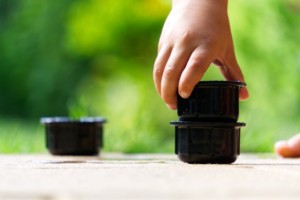If your child has been referred to an Occupational Therapist, you probably have a lot of questions. What is Occupation therapy? Why was my child referred to one? How will the Occupational therapist help my child?
What does occupational mean?
In this case, occupational refers to all the activities we do throughout the day. For children it means the actions that a child performs to reach their developmental milestones, self care activities such as bathing, dressing, and eating. As well as, become more independent, participate in school and play.
Why was my child referred to an Occupational therapist?
Foundational skills are vital for child development, being able to perform day to day functions. If there is a delay or a challenge for a child to accomplish these activities, an occupational therapist can help. Examples include:
 Difficulty completing work or following instructions
Difficulty completing work or following instructions
Easily distracted and has difficulty to focus on tasks
Wanders aimlessly without purposeful play
Poor impulse delay, grabbing at food, instead of using utensils
Difficulty interacting socially, not meeting age appropriate milestones
Overly heightened or sensitive reactivity to touch, sound, or movement
Emotionally reactive, throws temper tantrums when moving on to a new activity
How can occupational therapy help?
Occupational therapist work alongside of a child to identify the source of their challenges and current strengths to develop a targeted plan. Working on these areas to build to build age appropriate skill development.
First Words Speech Therapy provides individualized therapy for a variety of speech, language, and occupational needs. Therapy plans and schedules are determined after an initial evaluation takes place. Therapy visits include one-on-one treatment, followed by parent consultation for carryover of activities in the home
The Child Mind Institute describes how occupational therapists help children
Helping with gross motor skills
When gross motor skills involving the major muscle groups are at issue, the child will struggle with things like balance, coordination, strength and endurance, all of which will have a direct impact on everything from walking and climbing stairs to hopping, jumping and catching and throwing a ball. Such deficits can keep kids from participating in recess and sports, which can in turn affect socializing and self-esteem.
 Helping with fine motor skills
Helping with fine motor skills
Fine motor skills involve the small hand muscles. When there’s a lack of strength, motor control and dexterity, kids will have difficulty drawing, using scissors and stringing beads. Such delays, if not addressed, will make academics—turning pages, writing, using a computer—that much harder. They also come into play with regard to self-help skills including buttoning, zipping and using utensils.
Teaching self-help skills
To become proficient in self-help skills, children may need to work on fine motor skills for things like dressing and undressing (buttoning, zipping, tying shoes), grooming (brushing hair and teeth, using the toilet) and eating (holding and using utensils.) OTs will model and practice these skills with clients, using many of the techniques noted above. Sensory issues present a different challenge: For instance, a child who can’t stand getting her face wet, wearing anything that feels scratchy or tight, or putting anything in her mouth is also going to have trouble with activities of daily living.


